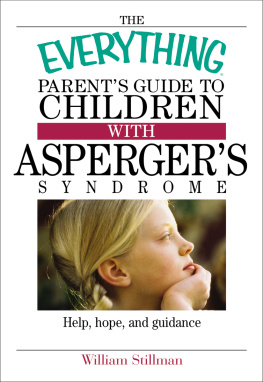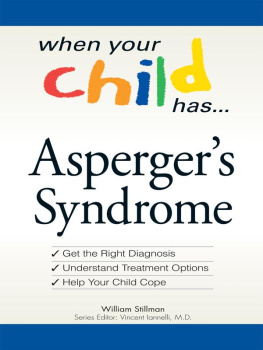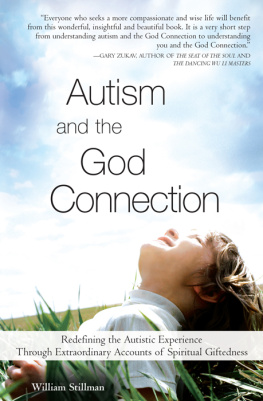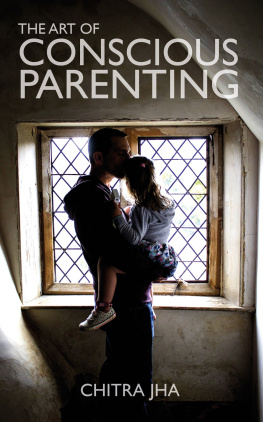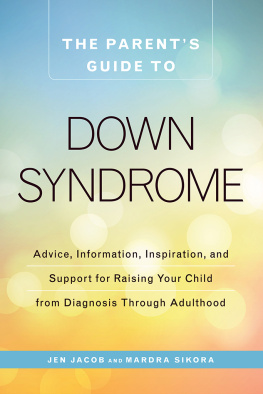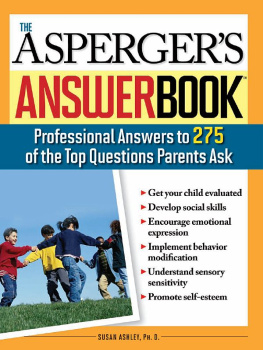Contents
Guide
The Conscious Parents Guide to Aspergers Syndrome
A mindful approach for helping your child succeed
William Stillman

Avon, Massachusetts
Dedication
For mindful parents everywhere.
Copyright 2016 by F+W Media, Inc.
All rights reserved.
This book, or parts thereof, may not be reproduced in any form without permission from the publisher; exceptions are made for brief excerpts used in published reviews.
Published by
Adams Media, a division of F+W Media, Inc.
57 Littlefield Street, Avon, MA 02322. U.S.A.
www.adamsmedia.com
Contains material adapted from The Everything Parents Guide to Children with Aspergers Syndrome, 2nd Edition by William Stillman, copyright 2010, 2005 by F+W Media, Inc., ISBN 10: 1-4405-0394-X, ISBN 13: 978-1-4405-0394-8.
ISBN 10: 1-4405-9314-0
ISBN 13: 978-1-4405-9314-7
eISBN 10: 1-4405-9315-9
eISBN 13: 978-1-4405-9315-4
Stillman, William.
The conscious parents guide to Aspergers syndrome / William Stillman.
pages cm
Includes index.
ISBN 978-1-4405-9314-7 (pb) -- ISBN 1-4405-9314-0 (pb) -- ISBN 978-1-4405-9315-4 (ebook) -- ISBN 1-4405-9315-9 (ebook)
1. Aspergers syndrome--Popular works. 2. Parent and child--Popular works. I. Title.
RC553.A88S837 2015
618.92'858832--dc23 2015030436
This book is intended as general information only, and should not be used to diagnose or treat any health condition. In light of the complex, individual, and specific nature of health problems, this book is not intended to replace professional medical advice. The ideas, procedures, and suggestions in this book are intended to supplement, not replace, the advice of a trained medical professional. Consult your physician before adopting any of the suggestions in this book, as well as about any condition that may require diagnosis or medical attention. The author and publisher disclaim any liability arising directly or indirectly from the use of this book.
Many of the designations used by manufacturers and sellers to distinguish their products are claimed as trademarks. Where those designations appear in this book and F+W Media, Inc. was aware of a trademark claim, the designations have been printed with initial capital letters.
Cover design by Frank Rivera.
Introduction
Long ago and far away, kids who drew detailed diagrams of spacecraft, created intricate models of the human digestive system, spent all their free time reading about medieval cathedrals, or enjoyed reciting complex dinosaur namesand preferred those isolated activities over playtime with peerswere labeled. The labels were a reflection of a so-called socially inappropriate desire to be absorbed with things, instead of people. Words often used to describe such kids may have included gifted, moody, antisocial, irritable, obsessed, geek, brainiac, or even stoic. They may have been thought of as outsiders, with no or few friends. As adults, they may have been considered odd and eccentric, loners or hermits.
Fortunately, today we are shifting our perception of what we now know to be Aspergers Syndrome. We are learning more about Aspergers as a milder cousin on the autism spectrum. (Some equate Aspergers with high-functioning autism.) We are accepting Aspergers as a legitimate framework to describe a unique experience. Slowly but surely, we are moving beyond stereotypes in our collective understanding of children with Aspergers. We are recognizing their different ways of thinking, different ways of perceiving the world, and different ways of being. As we grow in our sensitivity and understanding, we are better able to support and celebrate the child with Aspergers Syndrome. Instead of labeling a child as obsessed, we may now praise her giftedness and balance her needs to find a social niche.
We are learning more and more about autism all the time, but were only just beginning to scratch the surface of Aspergers Syndrome. Aspergers is still a very new consideration for parents and many prescribing doctors. There is much to explore on this broad learning curve: social differences, mental health, sensory sensitivities, and coping strategies that will be of lifelong value. Parents may become overwhelmed with clinical information that reinforces their childs perceived deficitsthe things she is not expected to be able to do in life. Other areas that may prompt confusion include options regarding learning and educational placement, training and programming, and therapies and techniques. Well-intentioned neighbors and family members may offer their perspectives based on what theyve heard or read, whether it has any factual basis or not. Considerations for a childs future living arrangements, adult relationships, and viable vocations may create family and marital stress.
Throughout this journey, it will be important for parents to remain grounded in one thought: We are all more alike than different. Understanding the child with Aspergers Syndrome is a learning opportunity for parents, siblings, and extended family.
When we foster an appreciation of the unique ways we all participate in the world, we are poised to better value those with Aspergers. When we actively project new and positive ways of supporting the child with Aspergers, she will respond in equally positive ways. The result is that a mutual relationship is strengthened tenfold, and a ripple effect occurs.
The Conscious Parents Guide to Aspergers Syndrome aids parents in making balanced, informed choices about their child and her future. Ideally, this journey is a partnership between parent and child in decision-making and education about Aspergers Syndrome. More than ever, a path of opportunity lies before parents of children with Aspergers Syndrome.
Chapter 1
Conscious Parenting
Being a conscious parent is all about building strong, sustainable bonds with your children through mindful living and awareness. Traditional power-based parenting techniques that promote compliance and obedience can disconnect you from your children. Conscious parenting, on the other hand, helps you develop a positive emotional connection with your child. Through empathetic understanding and tolerance you create a safe environment where your children feel their concerns are truly being heard. When you find yourself in a stressful situation with your child, rather than reacting with anger or sarcasm, conscious parenting reminds you to instead take a step back, reflect, and look for a peaceful solution. This approach benefits all children, especially those with Aspergers Syndrome. When your child is diagnosed with Aspergers, it can seem like all youre hearing are the negativesyour childs disabilities rather than his abilities. But the conscious parent knows how to temper this information to create a balanced perspective. Your child with Aspergers has much to offer in the form of gifts and talents. Adopting the conscious parenting philosophy can relieve your stress and improve your childs self-image.
The Benefits of Conscious Parenting
It is important to note that conscious parenting is not a set of rules or regulations that you must follow, but rather it is a system of beliefs. Conscious parents engage and connect with their children, using mindful and positive discipline rather than punishment. They try to be present when theyre spending time with their children, avoiding distractions such as TV and social media. Conscious parents respect their children and accept them as they are. The most important part of conscious parenting is building an emotional connection with your child so you can understand the underlying reasons for behavior.


